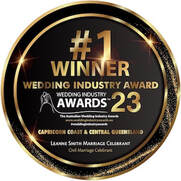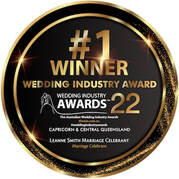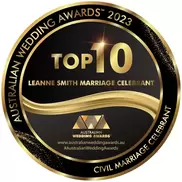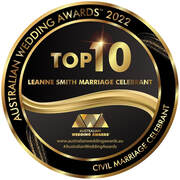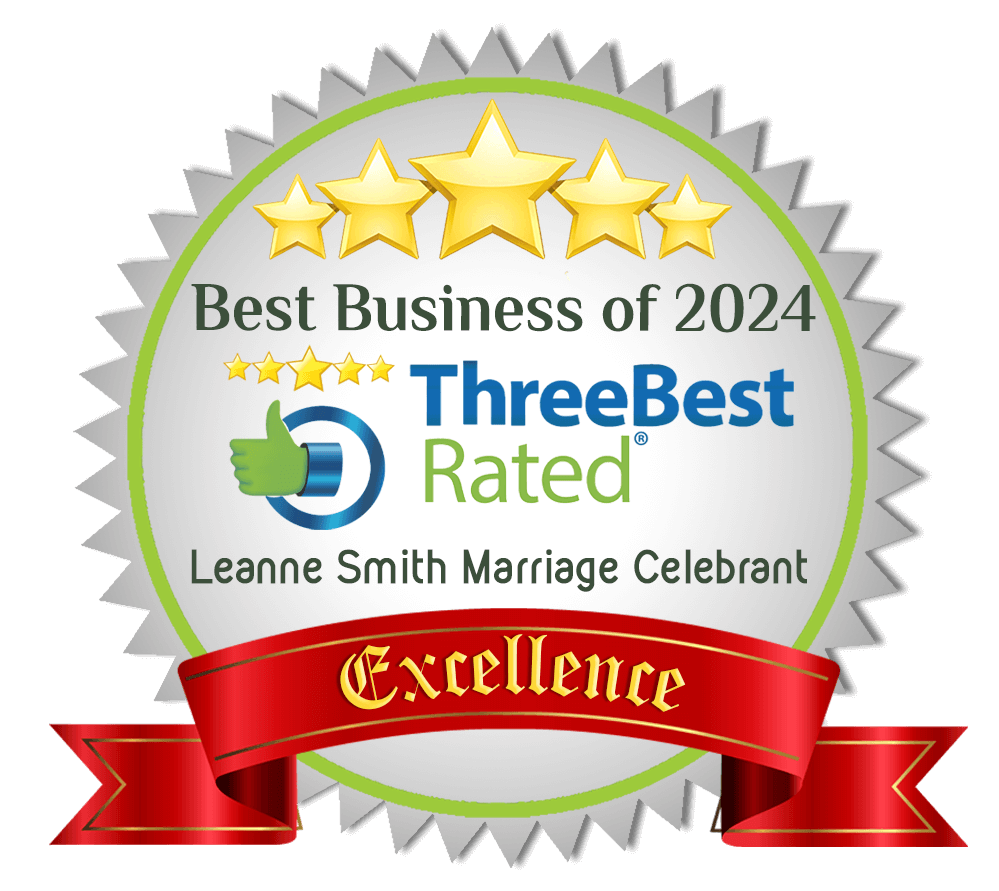Weddings & Marriages
What does your dream wedding look like?
I've been a hitcher and a ceremony maker for 15 years, servicing the Yeppoon, Rockhampton and Capricorn Coast areas in
Central Queensland. I'd love to be your celebrant and help that dream come true on the day. Give me a call anytime to talk about your plans.....
I've been a hitcher and a ceremony maker for 15 years, servicing the Yeppoon, Rockhampton and Capricorn Coast areas in
Central Queensland. I'd love to be your celebrant and help that dream come true on the day. Give me a call anytime to talk about your plans.....
Getting Married in Australia
There's a LOT of info following, your can download a PDF version HERE or scroll on through....
Who can get married in Australia?
In order to marry in Australia, parties to the marriage must meet the following criteria:
In order to marry in Australia, parties to the marriage must meet the following criteria:
- Parties must be aged 18 years or over
- Parties must not be married to someone else (or each other)
- Parties must not be in a prohibited relationship
- Parties must give real consent.
Why do we need a Celebrant?
Today, approximately 80% of marriages in Australia are performed by Commonwealth Registered Marriage Celebrants. The Marriage Celebrants Program was introduced in 1973 to provide a meaningful alternative for couples not wanting to marry in a religious institution or at a Registry Office. Civil celebrants are appointed by the Commonwealth Attorney General's Department to conduct ceremonies. Celebrants must be committed to professionalism and sensitivity in their performance of marriage ceremonies and must follow a complex set of legal rules.
It is the celebrant's role to explain the legal ramifications of marriage to couples and ensure they understand the relationship they are entering into; to complete legal paperwork that provides for the registration of the marriage; to write and deliver a ceremony that both satisfies legal requirements and is personal and special to each couple, and to respect and recognise the social, cultural and legal importance of marriage in Australia.
Today, approximately 80% of marriages in Australia are performed by Commonwealth Registered Marriage Celebrants. The Marriage Celebrants Program was introduced in 1973 to provide a meaningful alternative for couples not wanting to marry in a religious institution or at a Registry Office. Civil celebrants are appointed by the Commonwealth Attorney General's Department to conduct ceremonies. Celebrants must be committed to professionalism and sensitivity in their performance of marriage ceremonies and must follow a complex set of legal rules.
It is the celebrant's role to explain the legal ramifications of marriage to couples and ensure they understand the relationship they are entering into; to complete legal paperwork that provides for the registration of the marriage; to write and deliver a ceremony that both satisfies legal requirements and is personal and special to each couple, and to respect and recognise the social, cultural and legal importance of marriage in Australia.
Preparing for Your Big Day
Completing the Notice of Intended Marriage (NOIM)
Couples who meet the criteria listed above are free to marry in Australia. The first step in the process is giving notice to the Commonwealth Government through your celebrant that you wish to marry. The Notice of Intended Marriage must be completed at least one month, and no more than 18 months, prior to your ceremony. The completed NOIM remains with the celebrant until after the wedding is solemnised, at which point I will lodge it, along with your other wedding documents, with the Registry of Births, Deaths and Marriages. Most usually we meet face to face to prepare and lodge the NOIM but it can also be lodged with me electronically.
I need to see originals of the following documents:
To complete the NOIM we will also need the following information (some of it may be included on your birth certificate):
Signing the Declaration of No Legal Impediment to Marriage (DONLIM)
Both parties to the marriage will need to sign a declaration before the wedding that states that you are not currently married, that you are not in a prohibited relationship (e.g. siblings or parent and child), that you are of marriageable age (over 18 years old), and that you believe there is no other legal impediment to your marriage. It is often most convenient to do this at the rehearsal, but we can do it directly before the ceremony.
Completing the Notice of Intended Marriage (NOIM)
Couples who meet the criteria listed above are free to marry in Australia. The first step in the process is giving notice to the Commonwealth Government through your celebrant that you wish to marry. The Notice of Intended Marriage must be completed at least one month, and no more than 18 months, prior to your ceremony. The completed NOIM remains with the celebrant until after the wedding is solemnised, at which point I will lodge it, along with your other wedding documents, with the Registry of Births, Deaths and Marriages. Most usually we meet face to face to prepare and lodge the NOIM but it can also be lodged with me electronically.
I need to see originals of the following documents:
- Proof of your date and place of birth: either your official birth certificate OR passport. Passports are a convenient way of confirming your date and place of birth. However all the other information required to complete the NOIM (such as your mother’s full maiden name) can be found on your birth certificate, so if you don’t know this information it’s easier just to get a copy of your birth certificate! If the document you present is in another language, I will need to see a formal translation of it.
- Photo identification: your passport, driver's licence, or proof of age card.
- Evidence of the dissolution of your most recent marriage if you have been married previously: a divorce certificate or death certificate.
To complete the NOIM we will also need the following information (some of it may be included on your birth certificate):
- Parent(s) current full name, full birth name and country of birth
- Date of last marriage ended (if applicable)
Signing the Declaration of No Legal Impediment to Marriage (DONLIM)
Both parties to the marriage will need to sign a declaration before the wedding that states that you are not currently married, that you are not in a prohibited relationship (e.g. siblings or parent and child), that you are of marriageable age (over 18 years old), and that you believe there is no other legal impediment to your marriage. It is often most convenient to do this at the rehearsal, but we can do it directly before the ceremony.
Witnesses
Under the Marriage Act, a marriage may not be solemnised unless at least two persons are present at the ceremony who appear to be over the age of 18 years. They will sign the marriage certificates in their capacity as witnesses to your marriage.
It is your responsibility to arrange for the attendance of two witnesses. Many couples use their primary attendants as their witnesses, however you may like to invite other people such as your mothers or other guests to be the witnesses. The only rules are that the witnesses need to appear to be over 18, and need to be able to hear and understand the ceremony.
I will need you to let me know the full names of the witnesses prior to the ceremony so I can prepare the marriage certificates.
Under the Marriage Act, a marriage may not be solemnised unless at least two persons are present at the ceremony who appear to be over the age of 18 years. They will sign the marriage certificates in their capacity as witnesses to your marriage.
It is your responsibility to arrange for the attendance of two witnesses. Many couples use their primary attendants as their witnesses, however you may like to invite other people such as your mothers or other guests to be the witnesses. The only rules are that the witnesses need to appear to be over 18, and need to be able to hear and understand the ceremony.
I will need you to let me know the full names of the witnesses prior to the ceremony so I can prepare the marriage certificates.
Wedding Party
It is completely up to you who you choose to stand beside you at your ceremony, or even if you have a wedding party at all. A wedding party may include bridesmaids, groomsmen, bridesmen, groomsmaids, flower girls/boys, page boys/girls, ring bearers, whatever and whomever you like! Remember that you don't HAVE to have a wedding party at all, and if you do have one, that the numbers of attendants on each side DON'T have to be equal.
It is completely up to you who you choose to stand beside you at your ceremony, or even if you have a wedding party at all. A wedding party may include bridesmaids, groomsmen, bridesmen, groomsmaids, flower girls/boys, page boys/girls, ring bearers, whatever and whomever you like! Remember that you don't HAVE to have a wedding party at all, and if you do have one, that the numbers of attendants on each side DON'T have to be equal.
Rehearsal
I do encourage you to hold a rehearsal, it can be calming for the nerves and will allow us to go over some finer details about the ceremony. It is completely up to you whether or not we hold a rehearsal. I suggest having as many members of the wedding party in attendance if possible, plus anyone else who will be involved in the ceremony (such as giving a reading), but don't feel you can't have a rehearsal if you can't get everyone together; it can be difficult enough to get them all there on the wedding day, let alone for a rehearsal in the week before! We will run through the processional (the entrance of the wedding party), where everyone stands, how to physically move between the different sections of the ceremony, and any parts of the ceremony script you would like to rehearse. This is a particularly good opportunity for anyone giving a reading to practise. We can also test the PA system if necessary.
I encourage you to book a rehearsal time with the venue, usually in the week before or even the day before your wedding. Organise this with the venue and me as early as possible.
I do encourage you to hold a rehearsal, it can be calming for the nerves and will allow us to go over some finer details about the ceremony. It is completely up to you whether or not we hold a rehearsal. I suggest having as many members of the wedding party in attendance if possible, plus anyone else who will be involved in the ceremony (such as giving a reading), but don't feel you can't have a rehearsal if you can't get everyone together; it can be difficult enough to get them all there on the wedding day, let alone for a rehearsal in the week before! We will run through the processional (the entrance of the wedding party), where everyone stands, how to physically move between the different sections of the ceremony, and any parts of the ceremony script you would like to rehearse. This is a particularly good opportunity for anyone giving a reading to practise. We can also test the PA system if necessary.
I encourage you to book a rehearsal time with the venue, usually in the week before or even the day before your wedding. Organise this with the venue and me as early as possible.
Changing Your Name after the Wedding
Once you are married, one or both of you may wish to change your surname. To make this process a little easier for you I have provided information about what is required by some organisations in order to change your name. There are also many resources available online to help you with changing your name, including some name-change kits you can purchase.
Please note you don't actually need to change your name on any documentation if you don't want to. Many newly married people use their married name in social circles but keep their birth name on official documentation or for professional purposes. Also be aware that this is not a formal name change process through Births, Deaths and Marriages; you will not be issued with a new birth certificate as you would if you were formally changing one of your names given at birth for a reason other than marriage. When you change your name by marriage, basically you tell every organisation that has your name recorded that you want them to call you by a different name, and you produce your BDM issued Official Marriage Certificate as proof you are allowed to use that different name.
It's also worth remembering that both or either party can change their name after marriage. There are several options available to both parties. The Australian Passport Office says:
The parties may choose one of the following family name options on a passport due to marriage:
Step 1
The first step is to apply for a BDM Issued Official Marriage Certificate. Please note the decorative certificate I give you after your wedding ceremony is NOT sufficient evidence for most organisations to change your name. You can go right ahead and change your name on Facebook and some other places on the day of your wedding, but most legal entities won't change your name without this documentation.
The easiest way to apply for a BDM Issued Official Marriage Certificate in Queensland is to have your celebrant request it when lodging your marriage paperwork. You will receive a confirmation email after your marriage has been registered which will include a link to ordering and paying for your registered copy which will be posted to you for BDM. You can apply online to Births, Deaths and Marriages Qld (www.qld.gov.au/law/births-deaths-marriages-and-divorces).
If you have any other questions about applying for a marriage certificate, please give me call and I should be able to help you.
Step 2
Once you receive your BDM Issued Official Marriage Certificate you will then be able to change your name on your Driver's Licence and Passport. The requirements to change these documents are:
Driver's Licence
To change your name on your licence, you must visit a transport and motoring customer service centre with:
You will need to complete a Passport Renewal Application form (available at the Post Office or Online at www.passports.gov.au) and submit it at your nearest Passport Office, usually a local Post Office. You will also need to show them:
Step 3
Now that you have your BDM Issued Official Marriage Certificate and have changed your Driver's Licence and/or Passport, you should be able to change your name with all other organisations. The main places people need to change their details are listed on the following page, however this list is not exhaustive and there may be other organisations you need to notify.
Once you are married, one or both of you may wish to change your surname. To make this process a little easier for you I have provided information about what is required by some organisations in order to change your name. There are also many resources available online to help you with changing your name, including some name-change kits you can purchase.
Please note you don't actually need to change your name on any documentation if you don't want to. Many newly married people use their married name in social circles but keep their birth name on official documentation or for professional purposes. Also be aware that this is not a formal name change process through Births, Deaths and Marriages; you will not be issued with a new birth certificate as you would if you were formally changing one of your names given at birth for a reason other than marriage. When you change your name by marriage, basically you tell every organisation that has your name recorded that you want them to call you by a different name, and you produce your BDM issued Official Marriage Certificate as proof you are allowed to use that different name.
It's also worth remembering that both or either party can change their name after marriage. There are several options available to both parties. The Australian Passport Office says:
The parties may choose one of the following family name options on a passport due to marriage:
- Retain your existing family name
- Adopt your spouse's family name
- Adopt of combination of your family name and your spouse's family name with or without hyphens.
- Lisa Smith
- Lisa Jones
- Lisa Smith Jones
- Lisa Jones Smith
- Lisa Smith-Jones
- Lisa Jones-Smith.
Step 1
The first step is to apply for a BDM Issued Official Marriage Certificate. Please note the decorative certificate I give you after your wedding ceremony is NOT sufficient evidence for most organisations to change your name. You can go right ahead and change your name on Facebook and some other places on the day of your wedding, but most legal entities won't change your name without this documentation.
The easiest way to apply for a BDM Issued Official Marriage Certificate in Queensland is to have your celebrant request it when lodging your marriage paperwork. You will receive a confirmation email after your marriage has been registered which will include a link to ordering and paying for your registered copy which will be posted to you for BDM. You can apply online to Births, Deaths and Marriages Qld (www.qld.gov.au/law/births-deaths-marriages-and-divorces).
If you have any other questions about applying for a marriage certificate, please give me call and I should be able to help you.
Step 2
Once you receive your BDM Issued Official Marriage Certificate you will then be able to change your name on your Driver's Licence and Passport. The requirements to change these documents are:
Driver's Licence
To change your name on your licence, you must visit a transport and motoring customer service centre with:
- your application.
- evidence of your identity (your identity documents can show your old name)
- evidence of your name change (you must show an original, official document—for example, a marriage certificate)
You will need to complete a Passport Renewal Application form (available at the Post Office or Online at www.passports.gov.au) and submit it at your nearest Passport Office, usually a local Post Office. You will also need to show them:
- Official Marriage Certificate issued by Births, Deaths and Marriages
- Your current passport.
Step 3
Now that you have your BDM Issued Official Marriage Certificate and have changed your Driver's Licence and/or Passport, you should be able to change your name with all other organisations. The main places people need to change their details are listed on the following page, however this list is not exhaustive and there may be other organisations you need to notify.
Legal Obligations and Other Information
This section contains important information about my legal obligations in acting as your celebrant
Code of Practice for Marriage Celebrants(from Marriage Regulations 2017, Schedule 2)
1. Application of this Code of Practice
This Code of Practice applies to marriage celebrants.
Note 1: A marriage celebrant is a person registered under Subdivision C of Division 1 of Part IV of the Marriage Act 1961: see subsection 5(1) of that Act.
Note 2: Under paragraph 39I(1)(b) of that Act, if the Registrar of Marriage Celebrants is satisfied that a marriage celebrant has not complied with an obligation under section 39G of that Act, including this Code of Practice, the Registrar may take disciplinary measures against the marriage celebrant.
2. High standard of service
A marriage celebrant must maintain a high standard of service in his or her professional conduct and practice. This includes (without limitation) ensuring the following:
(a) appropriate personal presentation for marriage ceremonies;
(b) punctuality for marriage ceremonies;
(c) accuracy in preparation of documents and in the conduct of marriage ceremonies.
3. Recognition of significance of marriage
A marriage celebrant must recognise the social, cultural and legal significance of marriage and the marriage ceremony in the Australian community, and the importance of strong and respectful family relationships.
4. Compliance with the Act and other laws
A marriage celebrant must:
(a) comply with the requirements of the Marriage Act 1961 and the Marriage Regulations 2017 which apply to the marriage celebrant; and
(b) observe the laws of the Commonwealth and of any State or Territory in which the marriage celebrant solemnises marriages; and
(c) avoid unlawful discrimination in the provision of marriage celebrancy services.
5. General requirements for marriage ceremonies
A marriage celebrant must respect the importance of the marriage ceremony to the parties and the other persons organising the ceremony. This includes (without limitation) the following:
(a) giving the parties information and guidance to enable them to choose or compose a marriage ceremony, including information to assist the parties to decide whether a marriage ceremony rehearsal is needed or appropriate;
(b) respecting the privacy and confidentiality of the parties, including by:
(i) arranging for appropriate facilities to interview parties; and
(ii) dealing appropriately with personal documents and personal information; and
(iii) maintaining appropriate facilities for the secure storage of records; and
(iv) ensuring the return of all personal documents belonging to the parties as soon as practicable (unless it is necessary to keep the documents for the ceremony);
(c) giving the parties information about how to notify the Commonwealth Attorney‑General’s Department of any concerns or complaints they may have regarding the marriage services provided by the marriage celebrant.
6. Knowledge and understanding of family relationships services
A marriage celebrant must:
(a) maintain an up‑to‑date knowledge about appropriate family relationships services in the community; and
(b) inform the parties to the marriage about the range of information and services available to them to enhance, and sustain them throughout, their relationship.
Making a Complaint about an Authorised Marriage Celebrant
If at any time you are unhappy with the service I provide, please do not hesitate to discuss the situation with me. I will be only too happy to do everything in my power to rectify the situation. I want your ceremony to be unforgettable for all the right reasons.
In the event that I am unable to amend matters to you satisfaction, please be aware that there is a special procedure set out in the Marriage Regulations to enable complaints concerning the performance of marriage celebrants to be responded to.
For full details regarding the complaints procedure, please contact the Attorney General’s Department at the address below or visit the Department’s website:
http://www.ag.gov.au/FamiliesAndMarriage/Marriage/Pages/Complaintagainstamarriagecelebrant.aspx
The Registrar of Marriage Celebrants
Commonwealth Attorney-General's Department
3-5 National Circuit
BARTON ACT 2600
Australia
This section contains important information about my legal obligations in acting as your celebrant
Code of Practice for Marriage Celebrants(from Marriage Regulations 2017, Schedule 2)
1. Application of this Code of Practice
This Code of Practice applies to marriage celebrants.
Note 1: A marriage celebrant is a person registered under Subdivision C of Division 1 of Part IV of the Marriage Act 1961: see subsection 5(1) of that Act.
Note 2: Under paragraph 39I(1)(b) of that Act, if the Registrar of Marriage Celebrants is satisfied that a marriage celebrant has not complied with an obligation under section 39G of that Act, including this Code of Practice, the Registrar may take disciplinary measures against the marriage celebrant.
2. High standard of service
A marriage celebrant must maintain a high standard of service in his or her professional conduct and practice. This includes (without limitation) ensuring the following:
(a) appropriate personal presentation for marriage ceremonies;
(b) punctuality for marriage ceremonies;
(c) accuracy in preparation of documents and in the conduct of marriage ceremonies.
3. Recognition of significance of marriage
A marriage celebrant must recognise the social, cultural and legal significance of marriage and the marriage ceremony in the Australian community, and the importance of strong and respectful family relationships.
4. Compliance with the Act and other laws
A marriage celebrant must:
(a) comply with the requirements of the Marriage Act 1961 and the Marriage Regulations 2017 which apply to the marriage celebrant; and
(b) observe the laws of the Commonwealth and of any State or Territory in which the marriage celebrant solemnises marriages; and
(c) avoid unlawful discrimination in the provision of marriage celebrancy services.
5. General requirements for marriage ceremonies
A marriage celebrant must respect the importance of the marriage ceremony to the parties and the other persons organising the ceremony. This includes (without limitation) the following:
(a) giving the parties information and guidance to enable them to choose or compose a marriage ceremony, including information to assist the parties to decide whether a marriage ceremony rehearsal is needed or appropriate;
(b) respecting the privacy and confidentiality of the parties, including by:
(i) arranging for appropriate facilities to interview parties; and
(ii) dealing appropriately with personal documents and personal information; and
(iii) maintaining appropriate facilities for the secure storage of records; and
(iv) ensuring the return of all personal documents belonging to the parties as soon as practicable (unless it is necessary to keep the documents for the ceremony);
(c) giving the parties information about how to notify the Commonwealth Attorney‑General’s Department of any concerns or complaints they may have regarding the marriage services provided by the marriage celebrant.
6. Knowledge and understanding of family relationships services
A marriage celebrant must:
(a) maintain an up‑to‑date knowledge about appropriate family relationships services in the community; and
(b) inform the parties to the marriage about the range of information and services available to them to enhance, and sustain them throughout, their relationship.
Making a Complaint about an Authorised Marriage Celebrant
If at any time you are unhappy with the service I provide, please do not hesitate to discuss the situation with me. I will be only too happy to do everything in my power to rectify the situation. I want your ceremony to be unforgettable for all the right reasons.
In the event that I am unable to amend matters to you satisfaction, please be aware that there is a special procedure set out in the Marriage Regulations to enable complaints concerning the performance of marriage celebrants to be responded to.
For full details regarding the complaints procedure, please contact the Attorney General’s Department at the address below or visit the Department’s website:
http://www.ag.gov.au/FamiliesAndMarriage/Marriage/Pages/Complaintagainstamarriagecelebrant.aspx
The Registrar of Marriage Celebrants
Commonwealth Attorney-General's Department
3-5 National Circuit
BARTON ACT 2600
Australia
Privacy Statement
My business is bound by the Privacy Act 1988 (Cth), including the Information Privacy Principles, and also by the Code of Conduct for Marriage Celebrants.
I use the personal information you give me to complete the legally required forms for your marriage and to communicate with you during the process of creating your ceremony. I disclose information to other organisations only where required for your marriage to be legally registered. If you do not provide all the information requested, your marriage might not be able to be legally registered.
I maintain a record of the marriages I perform in the form of the Official Certificate of Marriage signed during the ceremony. I keep these certificates for a minimum of six years as per the requirement in the Marriage Regulations 2017.
You can access and correct the personal information I hold about you. Contact me via mail, phone or email.
Leanne Smith Commonwealth-appointed Marriage Celebrant
PO Box 1655 Yeppoon Qld 4703
0419 394 844
[email protected]
ABN 65974337545
My business is bound by the Privacy Act 1988 (Cth), including the Information Privacy Principles, and also by the Code of Conduct for Marriage Celebrants.
I use the personal information you give me to complete the legally required forms for your marriage and to communicate with you during the process of creating your ceremony. I disclose information to other organisations only where required for your marriage to be legally registered. If you do not provide all the information requested, your marriage might not be able to be legally registered.
I maintain a record of the marriages I perform in the form of the Official Certificate of Marriage signed during the ceremony. I keep these certificates for a minimum of six years as per the requirement in the Marriage Regulations 2017.
You can access and correct the personal information I hold about you. Contact me via mail, phone or email.
Leanne Smith Commonwealth-appointed Marriage Celebrant
PO Box 1655 Yeppoon Qld 4703
0419 394 844
[email protected]
ABN 65974337545
What Happens If I'm Sick?
I would have to be exceptionally unwell to not attend your wedding ceremony, but emergencies do sometimes occur. In the highly unlikely event that I am unable to marry you, I would find a replacement celebrant to conduct your ceremony, and pass all legally required documentation and the ceremony on to them. As a member of a professional association (Australian Federation of Civil Celebrants), an advertiser on several wedding directories, and a member of a number of informal celebrant networks, I know a LOT of celebrants, so I can guarantee you that I would be able to find someone amazing to take over on your special day.
I would have to be exceptionally unwell to not attend your wedding ceremony, but emergencies do sometimes occur. In the highly unlikely event that I am unable to marry you, I would find a replacement celebrant to conduct your ceremony, and pass all legally required documentation and the ceremony on to them. As a member of a professional association (Australian Federation of Civil Celebrants), an advertiser on several wedding directories, and a member of a number of informal celebrant networks, I know a LOT of celebrants, so I can guarantee you that I would be able to find someone amazing to take over on your special day.

